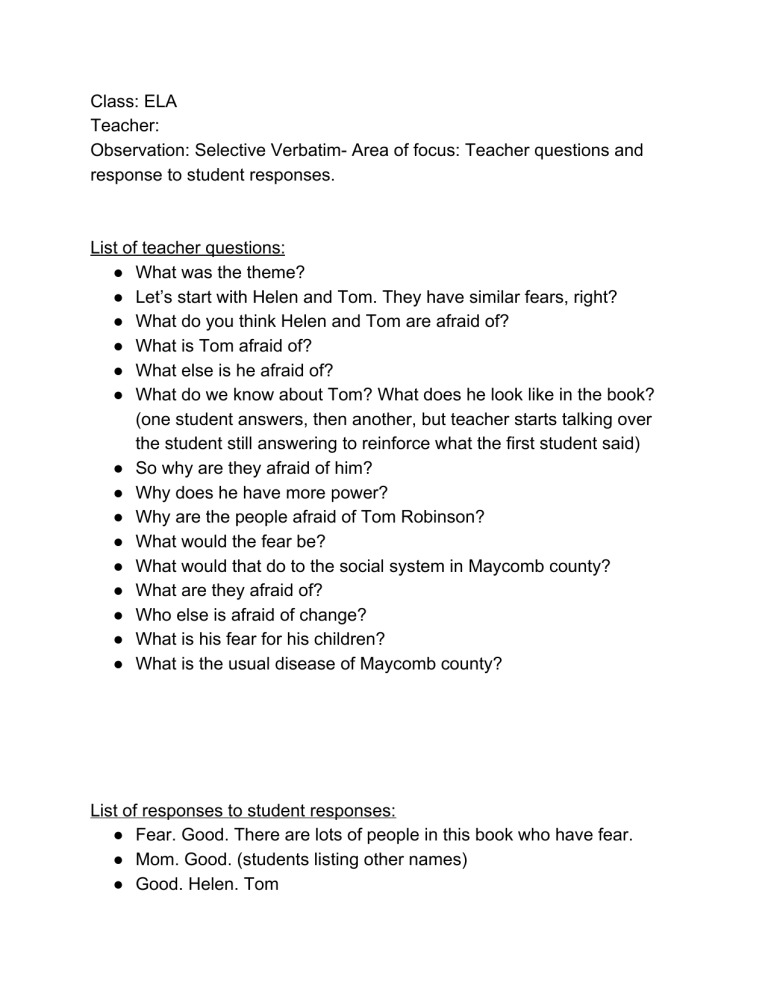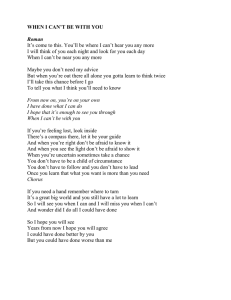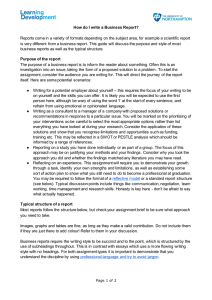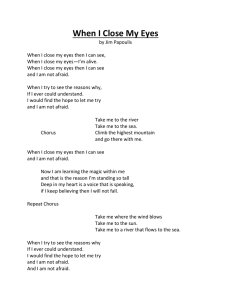
Class: ELA Teacher: Observation: Selective Verbatim- Area of focus: Teacher questions and response to student responses. List of teacher questions: ● What was the theme? ● Let’s start with Helen and Tom. They have similar fears, right? ● What do you think Helen and Tom are afraid of? ● What is Tom afraid of? ● What else is he afraid of? ● What do we know about Tom? What does he look like in the book? (one student answers, then another, but teacher starts talking over the student still answering to reinforce what the first student said) ● So why are they afraid of him? ● Why does he have more power? ● Why are the people afraid of Tom Robinson? ● What would the fear be? ● What would that do to the social system in Maycomb county? ● What are they afraid of? ● Who else is afraid of change? ● What is his fear for his children? ● What is the usual disease of Maycomb county? List of responses to student responses: ● Fear. Good. There are lots of people in this book who have fear. ● Mom. Good. (students listing other names) ● Good. Helen. Tom ● Good. So persecution…. ● Good (response to Tom fear) ● He’s a cripple. He’s a crippled black man (response to student response using the same verbiage) ● Good, because it’s a sin to kill a…. ● Good. That a black man could humiliate a while man…. ● Change. ● Good. he wants society to be changed. ● Good. He says there’s a disease. ● Racism. Good. ● He doesn’t want his children to be racist. Reflection for ELA Teacher: Thank you Ms. _______ for allowing me to observe your class today. Your students are very engaged and you keep the discussion lively by asking a great deal of questions about the text. This ensures that the students have read the book and can actively participate in class discussion. Keeping the conversation lively and engaged can prevent students from “zoning out” and getting into off-task behavior. Asking them questions throughout the lesson is a great way to keep the energy high in class, and you can work your way up the Bloom’s ladder by starting with recall questions and work your way into those deeper, analytical/application questions to ensure they are thinking about ideas and themes and not just fictional people, places, or events. My main suggestion would be how students answer questions in class, and how you give immediate feedback when they do so. First, students in class were randomly answering questions a few at a time, but as the conversation continued, more were answering questions and it became a bit confusing on who you were taking answers from. Perhaps you can reinforce hand-raising and be selective and thorough with waiting for a full answer. Also, while your responses are reinforcing that they have answered the questions correctly, I would love to see your responses be a bit more diverse than simply saying “good” whenever they answer in a way that you are pleased with. This will ensure that they can feel a level of confidence in their responses. Thank you again for giving me the opportunity to sit in your class today. I look forward to visiting again soon!


![----Original Message----- From: [ ] Sent: Tuesday, March 22, 2005 10:42 AM](http://s2.studylib.net/store/data/015586648_1-cdcb6798a28b44967c90ad6d9b736542-300x300.png)


